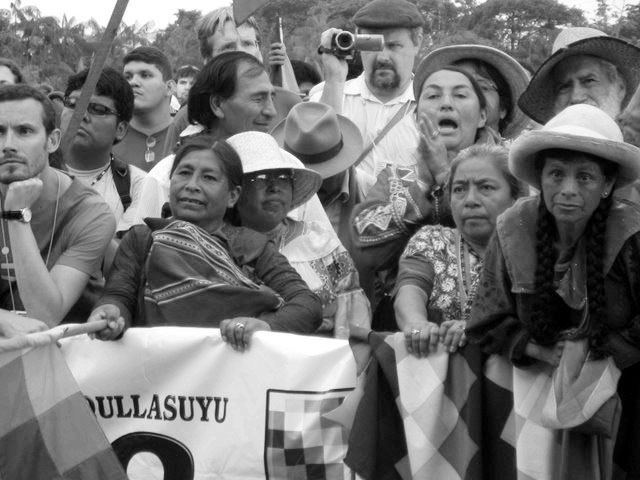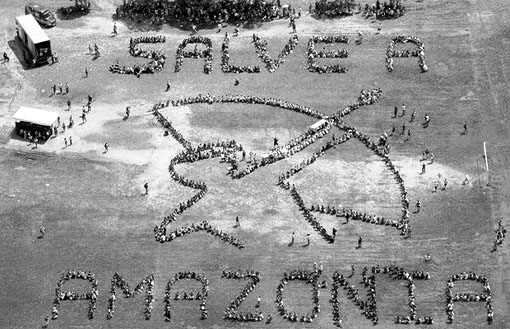 Rescuing the Pacha Mama (Mother Earth)
Rescuing the Pacha Mama (Mother Earth)
The problem of the food crisis is not exclusive to indigenous women, but they have suggestions on rising above the crisis. One thing stands out—the rescue of Pacha Mama, Mother Earth.
The adherence to mother earth–the practice of ancient cultivation, food production customs, and natural ways of conservation and the struggles against the introduction of genetically modified products and the privatisation of water are just some suggestions by indigenous women from different Latin American peoples to overcome the food crisis.
They gathered at the 9th World Social Forum (WSF) Belem, Para, Brazil. They emphasised the importance of women’s participation in the resolution of the problems that presently pressure humanity.
Dressed in the traditional costumes of each ethnic group, displaying their jewels produced by the same community of women, the indigenous women present in Brazil followed the call of a larger number of other organisations from diverse social movements. They too expressed their thoughts, they came to express their vision of a different world. They do not want to remain silent with regard to what is happening to the environment, the suffering of mother earth, and theirs as mothers. Therefore they are planning the first summit of indigenous women within the Fourth Summit of the Indigenous Peoples that will take place in Cuno, Peru in May 2009.
For Claudia Herera, a Huarpe woman, the problem has to do with the relocation of production away from ancient agricultural territories to make room for open pit mining. At the same time, the monoculture of soya has replaced other products that used to serve the nutritional requirements of the aboriginal peoples of Mendoza in Argentina. For Claudia, the indigenous peoples have suffered from hunger since long ago because of the development that came with those in power. The indigenous women have always had basic knowledge that was historically well-kept by their mothers, grandmothers and great grandmothers. “Already, our ancestors saw in their visions that in these times, the powerful ones who would like to erase all, will let us live because of this knowledge on spirituality and world visions kept in the chests of our women,” she shared.
Meanwhile, Francisca comes from Guatemala and works with poor communities in marginalised areas. For her, genetic engineering only harms the health of the women and the entire population: “The problem we experience in Guatemala is that our meals are getting poorer and faster to cook, to the extent that we only have to boil water and pour in the food. For us who work in the fields, this is not viable because our food is no longer natural. We advice people to serve meals such as beans, rice, potatoes and all the vegetables.”
Francisca exhorted everyone to discontinue the consumption of preserved food. “We should no longer drink Coca Cola, instead we should consume our lemons, natural fruits that are being harvested in the fields,” she asserted. Knowing that it will not be easy to change present habits, she nonetheless maintained that such change is the only way to help ourselves. “It will help us in the cities and we will help the countryside so that the financial resources will flow back and we will no longer collaborate with transnational companies, because they bring us food that we do not know what it contains,” she added. This Guatemalan woman further remarked, “The resistance of the indigenous people happens as we continue to eat our own food that was left to us by our ancestors.”
Many indigenous women have fought side by side with many men who tried to transform the situation of the peoples of Latin America. Some entered history as social resistance fighters without reaching their objective. But this is not the case for Viviana Lima, a Bolivian leader who is now part of the government in La Paz. She has had the privilege to experience transformation, obtaining a post in the government of president Evo Morales.
For Viviana, the global food crisis is a consequence of the dwindling natural products. “Natural products are disappearing, terminated by transnational enterprises and genetic engineering. In Santa Cruz, for example, they already produce genetically modified vegetables, fruits and cereals. Before we ate natural products. Bread was not consumed but today it exists in excess and it has molds,” she explained.
As a member of the women’s council, Viviana works on the promotion of indigenous tradition in food production. This includes the production of natural fertilisers by raising llamas, alpaca and ewes. “Today the pasture is no longer enough to raise animals that could produce natural fertilisers. The transnationals send us easy-to-use chemical fertilisers such as Urea for humidity,” she added. But Viviana and other Bolivian women are undaunted, determined to change the situation especially as they become more conscious on “how these developed countries extract our money.”
“We know that they think as they have colonised us, we are nothing else but waiting to receive and buy their products. Therefore as women, we are united, ready with answers, always thinking of our children and grandchildren in the future, because for us noon has already passed and we no longer hope for a good life,” she expressed.
Viviana stressed that there is more beyond luxury, jewels, car, houses and other goods that money can buy. For her “good life” is still measured by how one lives as part of the community with respect, reciprocity and humility especially towards nature. “We must defend our land, our fresh water that we have in Bolivia. Without water, there is no life, there is no life without land nor is there production. Therefore this land, the Pacha Mama, belongs to the indigenous peoples and it does not belong to those who have come from abroad,” she affirmed.
Viviana is clear and convincing and her discourse is continuous. That is the way they talk, the women of the land of America, who want to share their words with other women who did not grow up caring for Pacha Mama, the great generator of life.
 Therefore Magdalena Ayzabocha, a leader of the Quechua women of Equador is joining her fellow indigenous women in organising the Fourth Summit of Indigenous Women. “So that the women from all over the world can exchange and strengthen each other. We are in global solidarity with all the women. We know that we also need to have access to the level where decisions are taken,” she said.
Therefore Magdalena Ayzabocha, a leader of the Quechua women of Equador is joining her fellow indigenous women in organising the Fourth Summit of Indigenous Women. “So that the women from all over the world can exchange and strengthen each other. We are in global solidarity with all the women. We know that we also need to have access to the level where decisions are taken,” she said.
She further asserted, “We no longer believe in genetic engineering. We want what our earth produces, that the water is for the agriculture and not for sale, that there should be subsidies for agricultural products, so that the production work becomes beneficial to our all of us and our companions, so that it will improve the nutrition of everyone in the cities. So that there will no longer be servility.”
This land, the Pacha Mama, belongs to the indigenous peoples and it does not belong to those who have come from abroad.
Maria Everada, Maya-Hawk Kikeh women and member of the National Coordination of the Widows in Guatemala emphasises the importance to rescue the world vision of the aboriginal peoples. “We are here because a solar cycle will end by 2012 based on our holy calendar. When it ends, we will receive a new solar cycle, committing ourselves, principles and values to the future change. We are here to construct this change which awaits the whole world. It is our tradition and vision that the future will represent multi-culturality. I believe that is what we are constructing. We, women need to be here, strengthen our actions to participate in our mission and vision, because women are part of the society. We are part of humanity.”
Despite women’s crucial role in the families, communities and even the ecosystem, Maria lamented that women have not been given the space to decide.For the Latin American indigenous women, the food crisis does not only affect women, but the entire indigenous populations. It is a world problem that can be resolved through solidarity among the different cultures, the inclusion of the different world visions, rescuing the traditions and preserving the foods that have nourished humans for thousands of years.





 The
The 
 Isis Resource Center holds one of the largest feminist collections of materials in the Global South. With 40 years of publication experience, Isis holds a vast collection.
Isis Resource Center holds one of the largest feminist collections of materials in the Global South. With 40 years of publication experience, Isis holds a vast collection.